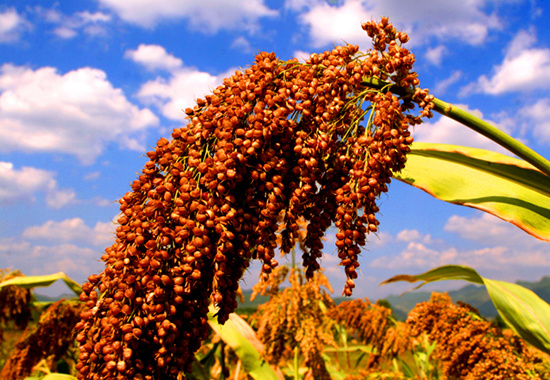Long Pan, Shaoxuan Feng, Wang Li, Weiyun Zhu
 The site and extent
of digestion of sorghum nutrients affected by tannins in the intestine are not
clarified. Porcine small intestine digestion and large intestine fermentation
were simulated in vitro to determine the effects of sorghum tannin extract on
the digestion and fermentation characteristics of nutrients in the mimicked
porcine gastrointestinal tract. In experiment 1,
low-tannin sorghum grain without or with 30 mg/g sorghum tannin extract were
digested by porcine pepsin and pancreatin to measure in vitro digestibility of
nutrients. In experiment 2, the lyophilized porcine ileal digesta from 3
barrows (Duroc × Landrace × Yorkshire, 27.75 ± 1.46 kg) fed the low-tannin
sorghum grain without or with 30 mg/g sorghum tannin extract and the undigested
residues from experiment 1 were, individually, incubated with fresh pig cecal
digesta as inoculums for 48 h to simulate the porcine hindgut fermentation. The
results revealed that sorghum tannin extract decreased in vitro digestibility
of nutrients both by pepsin hydrolysis or pepsin-pancreatin hydrolysis
(P < 0.05). Although enzymatically unhydrolyzed
residues provided more energy (P = 0.09) and nitrogen (P < 0.05) as
fermentation substrates, the microbial degradation of nutrients from
unhydrolyzed residues and porcine ileal digesta were both decreased by sorghum
tannin extract (P < 0.05). Regardless of unhydrolyzed residues or ileal
digesta as fermentation substrates, microbial metabolites including the
accumulative gas production excluding the first 6 h, total short-chain fatty
acid and microbial protein content in the fermented solutions were decreased
(P < 0.05). The relative abundances of
Lachnospiraceae AC2044 and NK4A136 and Ruminococcus_1 was decreased by sorghum
tannin extract (P < 0.05). In conclusion, sorghum tannin extract not
only directly decreased the chemical enzymatic digestion of nutrients in the
simulated anterior intestine, but also directly inhibited the microbial
fermentation including microbial diversities and metabolites in the simulated
posterior intestine of pigs. The experiment implies that the decreased
abundances of Lachnospiraceae and Ruminococcaceae by tannins in the hindgut may
weaken the fermentation capacity of microflora and thus impair the nutrient
digestion in the hindgut, and ultimately reduce the total tract digestibility
of nutrients in pigs fed high tannin sorghum.
The site and extent
of digestion of sorghum nutrients affected by tannins in the intestine are not
clarified. Porcine small intestine digestion and large intestine fermentation
were simulated in vitro to determine the effects of sorghum tannin extract on
the digestion and fermentation characteristics of nutrients in the mimicked
porcine gastrointestinal tract. In experiment 1,
low-tannin sorghum grain without or with 30 mg/g sorghum tannin extract were
digested by porcine pepsin and pancreatin to measure in vitro digestibility of
nutrients. In experiment 2, the lyophilized porcine ileal digesta from 3
barrows (Duroc × Landrace × Yorkshire, 27.75 ± 1.46 kg) fed the low-tannin
sorghum grain without or with 30 mg/g sorghum tannin extract and the undigested
residues from experiment 1 were, individually, incubated with fresh pig cecal
digesta as inoculums for 48 h to simulate the porcine hindgut fermentation. The
results revealed that sorghum tannin extract decreased in vitro digestibility
of nutrients both by pepsin hydrolysis or pepsin-pancreatin hydrolysis
(P < 0.05). Although enzymatically unhydrolyzed
residues provided more energy (P = 0.09) and nitrogen (P < 0.05) as
fermentation substrates, the microbial degradation of nutrients from
unhydrolyzed residues and porcine ileal digesta were both decreased by sorghum
tannin extract (P < 0.05). Regardless of unhydrolyzed residues or ileal
digesta as fermentation substrates, microbial metabolites including the
accumulative gas production excluding the first 6 h, total short-chain fatty
acid and microbial protein content in the fermented solutions were decreased
(P < 0.05). The relative abundances of
Lachnospiraceae AC2044 and NK4A136 and Ruminococcus_1 was decreased by sorghum
tannin extract (P < 0.05). In conclusion, sorghum tannin extract not
only directly decreased the chemical enzymatic digestion of nutrients in the
simulated anterior intestine, but also directly inhibited the microbial
fermentation including microbial diversities and metabolites in the simulated
posterior intestine of pigs. The experiment implies that the decreased
abundances of Lachnospiraceae and Ruminococcaceae by tannins in the hindgut may
weaken the fermentation capacity of microflora and thus impair the nutrient
digestion in the hindgut, and ultimately reduce the total tract digestibility
of nutrients in pigs fed high tannin sorghum.
2023, JAS, 101: skad126
https://doi.org/10.1093/jas/skad126
Registration hotline: 021-57634675
fax: 021-57632800
Copy right : 上海亘泰实业集团
Collaboration & Sponsorship: 021-57634938 57631012
ASASHotline:021-67868428
Site Map | CNZZStatistics
address:Shanghai songjiang jiuting town nine new highway 90 lane 3 nine new commercial building 15 floor

WeChat ID:asaschina
The pig nutrition international BBS CSIS